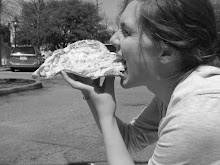When I first started reading "The Critic as Artist," I wasn't appreciating what Wilde had to say, and instead getting bogged down by the long blocky paragraphs. But, when, I read without that feeling of judgement and irritation, my love for Oscar Wilde was renewed. What a happy ending.
Specifically, I love what he's saying in the beginning about the critic and the creator being one and the critic having the particular difficult job of setting the standard. Sometimes while I'm writing reviews I feel like, in order to give accurate feedback, I need to have a broader knowledge of the type of movie I'm writing about. For instance, I have those friends who know everything about music, or everything about movies and directors and can give such a specific assessment based on the director's other works and the actors' roles through the last ten years that when I try to rebut anything they say, it sound's like a third grader during show-and-tell. Once I had a discussion about the first three Star Wars movies (Phantom Menace, etc.) my friend went on and on about the script and the acting and all I had to say was, "But, the colors were really vibrant. Yeah, I really liked all the colors."
Next, I agree with his ideas about the artist and how the artist shouldn't be too concerned with the meaning of her piece, "The longer I study, Ernest, the more clearly I see that the beauty of the visible arts is, as the beauty of music, impressive primarily, and that it may be marred, and indeed often is so, by any excess of intellectual intention on the part of the artist." When someone writes or paints something with the intention of making it deep and meaningful or abstract, it often comes out as flat and bland. Once I was speaking with an author about a piece of short fiction she wrote, and I said, rather stupidly, "I love the character of the father, the details you tell us about him seem so random, yet paint such a specific and coherent picture of him." And the author then started arguing with me about the word "random" and how everything she wrote in the piece she wrote on purpose. After having spoken with other writers and having written some myself, I think anyone who sits down and writes every detail consciously to paint a picture is compromising the integrity of the piece and questioning the intellect of the reader.
The last point I like about Wilde is about the personality of the critic being part of the critique. Ernest: I would have said that personality would have been a disturbing element.
Gilbert: No; it is an element of revelation. If you wish to understand others you must intensify with your own individualism.
It made me think back to the reviews I've been reading and the kind I like the most is when I get a sense of the author as they're assessing the piece. Oscar Wilde also said that art is a reflection of the viewer and not of life itself, and it's always more interesting to read about people and what they enjoy than a robotic, lifeless review. Well, not always, but if the writer is talented, then yes.
Very lastly, as a senior, this line is saving my soul right now: Each of the professions means a prejudice. The necessity for a career forces everyone to take sides.
Subscribe to:
Post Comments (Atom)

I TOTALLY identify with what you're saying about not feeling like you know enough information about a general subject when you go to write your review. That happens to me ALL the time - I sit at my computer and wonder how stupid people are going to think I am when they read my review, how obvious it's going to be that I wasn't an expert on "X" going into the movie.
ReplyDeleteYes, yes, yes!
ReplyDeleteAnd you always have the choice to educate yourselves, no?